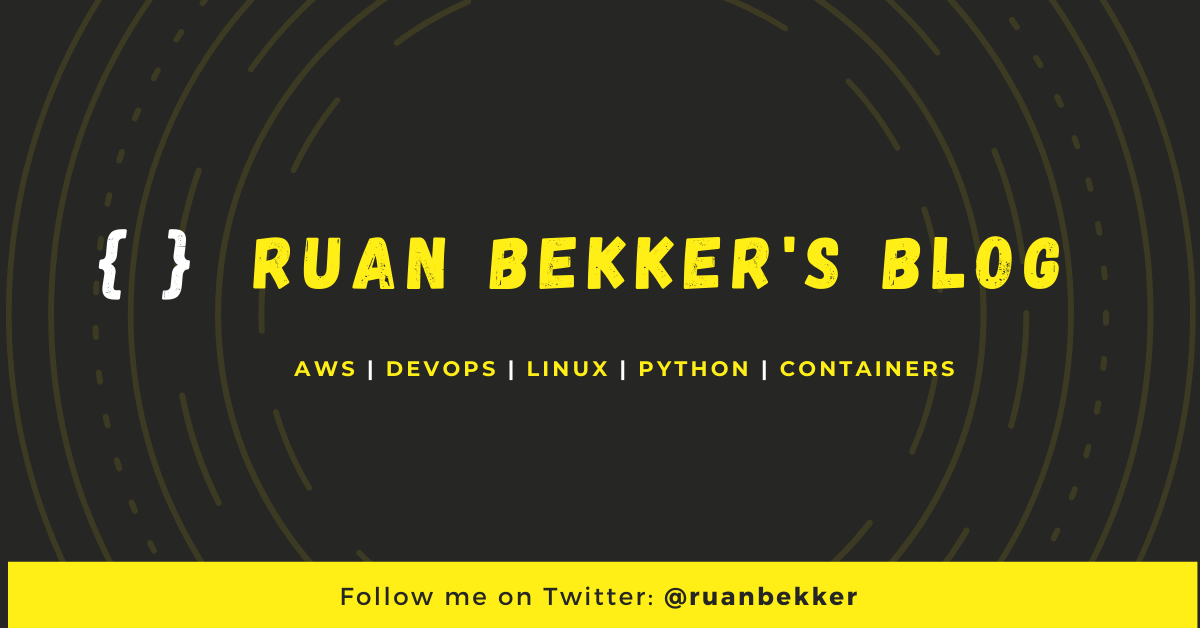- Published on
Task runner with YAML config written in Go
- Authors

- Name
- Ruan Bekker
- @ruanbekker

Task (aka Taskfile) is a task runner written in Go, which is similar to GNU Make, but in my opinion is a lot easier to use as you specify your tasks in yaml.
What to expect
In this post we will go through a quick demonstration using Task, how to install Task, as well as a couple of basic examples to get you up and running with Task.
Install
For mac, installing task::
$ brew install go-task/tap/go-task
For linux, installing task:
$ sh -c "$(curl --location https://taskfile.dev/install.sh)" -- -d -b /usr/local/bin
Or manual installation for arm as an example:
$ pushd /tmp
$ wget https://github.com/go-task/task/releases/download/v3.7.0/task_linux_arm.tar.gz
$ tar -xvf task_linux_arm.tar.gz
$ sudo mv task /usr/local/bin/task
$ sudo chmod +x /usr/local/bin/task
$ popd
Verify that task is installed:
$ task --version
Task version: v3.7.0
For more information check the installation page:
Usage
Task uses a default config file: Taskfile.yml in the current working directory where you can provide context on what your tasks should do.
To generate a Taskfile.yml with example config, task gives us a --init flag to generate a sample.
For a basic hello-world example, our task helloworld will echo out hello, world!. To generate the sample code, run:
task --init
Then update the config, to the following:
version: '3'
tasks:
helloworld:
desc: prints out hello world message
cmds:
- echo "hello, world!"
To demonstrate what the config means:
tasks: refers to the list of taskshelloworld: is the task namedesc: describes the task, useful for listing taskscmds: the commands that the task will execute
To list all our tasks for our taskfile:
$ task --list
task: Available tasks for this project:
* helloworld: prints out hello world message
Which we call using the application task with the argument of the task name:
$ task helloworld
task: [helloworld] echo "hello, world!"
hello, world!
We can also reduce the output verbosity using silent:
version: '3'
tasks:
helloworld:
desc: prints out hello world message
cmds:
- echo "hello, world!"
silent: true
Which will result in:
$ task helloworld
hello, world!
For a example using environment variables, we can use it in two ways:
- per task
- globally, across all tasks
For using environment variables per task:
version: '3'
tasks:
helloworld:
cmds:
- echo "hello, $WORD!"
env:
WORD: world
Results in:
$ task helloworld
task: [helloworld] echo "hello, $WORD!"
hello, world!
For using environment variables globally across all tasks:
version: '3'
env:
WORD: world
tasks:
helloworld:
cmds:
- echo "hello, $WORD!"
env:
GREETING: hello
byeworld:
cmds:
- echo "$GREETING, $WORD!"
env:
GREETING: bye
Running our first task:
$ task helloworld
task: [helloworld] echo "hello, $WORD!"
hello, world!
And running our second task:
$ task byeworld
task: [byeworld] echo "$GREETING, $WORD!"
bye, world!
To store your environment variables in a .env file, you can specify it as the following in your Taskfile.yml:
version: '3'
dotenv: ['.env']
tasks:
helloworld:
cmds:
- echo "hello, $WORD!"
env:
GREETING: hello
byeworld:
cmds:
- echo "$GREETING, $WORD!"
env:
GREETING: bye
And in your .env:
WORD=world
Then you should see your environment variables referenced from the .env file:
$ task helloworld
task: [helloworld] echo "hello, $WORD!"
hello, world!
We can also reference config using vars:
version: '3'
vars:
GREETING: Hello, World!
tasks:
default:
desc: prints out a message
cmds:
- echo "{{.GREETING}}"
In this case our task name is default, therefore we can only run task without any arguments, as default with be the default task:
$ task
task: [default] echo "Hello, World!"
Hello, World!
To run both tasks with one command, you can specify dependencies, so if we define a task with zero commands but just dependencies, it will call those tasks and execute them:
version: '3'
env:
WORD: world
tasks:
helloworld:
cmds:
- echo "hello, $WORD!"
env:
GREETING: hello
byeworld:
cmds:
- echo "$GREETING, $WORD!"
env:
GREETING: bye
all:
deps: [helloworld, byeworld]
So when we run the all task:
$ task all
task: [helloworld] echo "hello, $WORD!"
hello, world!
task: [byeworld] echo "$GREETING, $WORD!"
bye, world!
For more usage examples, have a look at their documentation:
Thank You
Thanks for reading, feel free to check out my website, and subscribe to my newsletter or follow me at @ruanbekker on Twitter.
- Linktree: https://go.ruan.dev/links
- Patreon: https://go.ruan.dev/patreon
